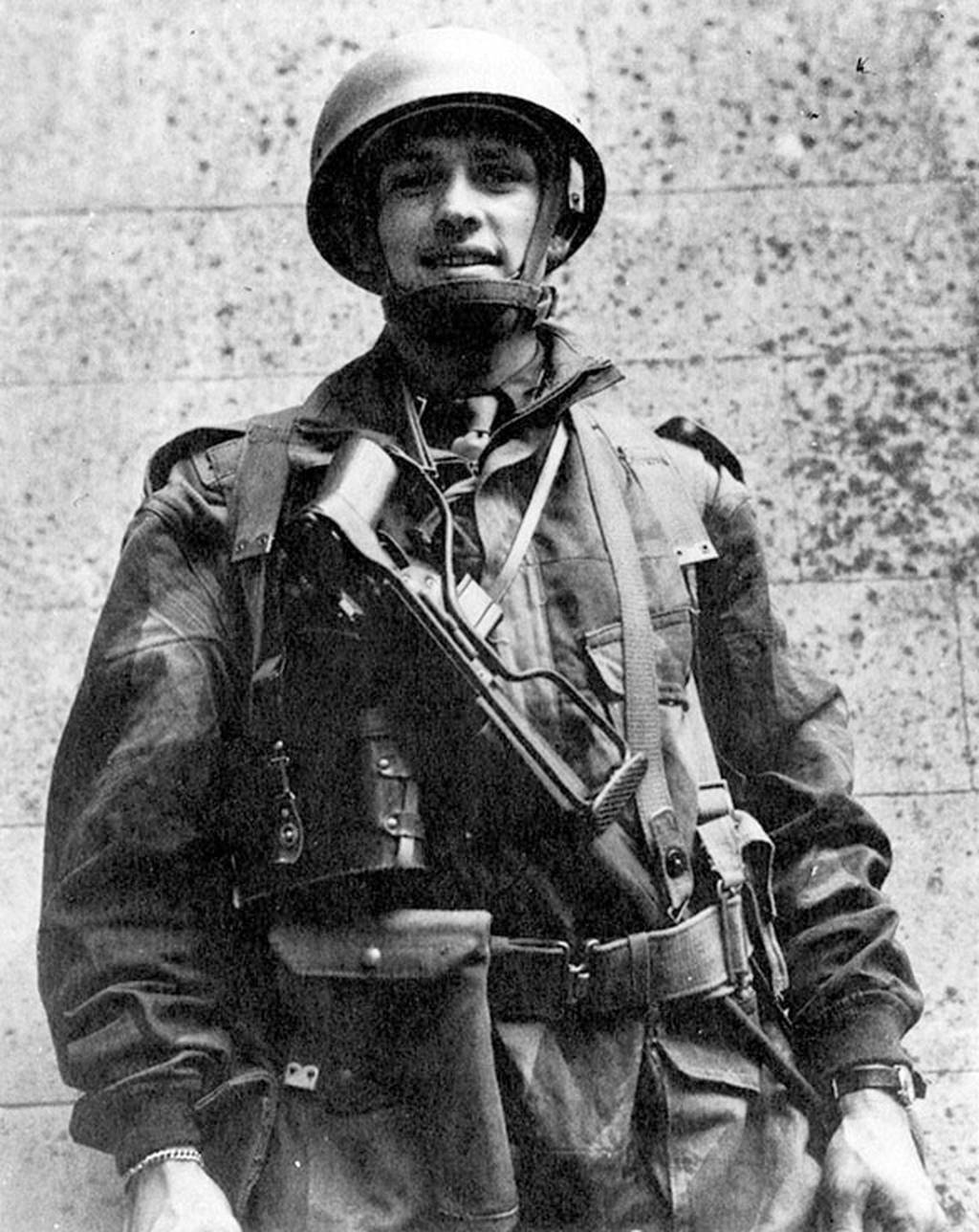Retired Army Maj. Gen. John Singlaub, a decorated veteran of World War II, Korea, and Vietnam, and legendary special operator, died Jan. 29 at the age of 100.
Singlaub, a native of Independence, California, commissioned as a U.S Army 2nd lieutenant, following his graduation from the University of California, Los Angeles, in 1943. Singlaub was quickly recruited by the Office of Strategic Services, the precursor to both the Central Intelligence Agency and U.S. Army Special Forces.
Will Irwin, a retired Army lieutenant colonel and author of “The Jedburghs: The Secret History of the Allied Special Forces, France 1944,” told Military Times that Singlaub parachuted behind German lines in Southern France as part of the OSS’ “Project Jedburgh.”
According to U.S. Army Special Operations Command, Singlaub was one of only 83 Americans selected for the program, along with 90 British, 103 French, 5 Belgian and 5 Dutch operatives. Jedburgh operatives, working in teams no larger than four men, helped organize French resistance while also providing intelligence on and harassment of German lines of communication.
Ultimately, Singlaub’s efforts helped Allied forces break out of Normandy during the summer of 1944.
Following the surrender of Germany in May 1945, Singlaub was transferred to the Pacific theater to continue OSS operations. On Aug. 27, 1945, Singlaub parachuted with an eight-man team onto the Chinese island of Hainan, where they rescued hundreds of Dutch and Australian prisoners of war. Following the surrender of Japan, Singlaub remained in the Pacific, continuing to report on the Chinese civil war.
In 1951, Singlaub, now a major, was again off to war in Korea. According to the Army, from 1951-52, Singlaub served as the deputy commander and chief of staff of the Joint Advisory Commission, Korea. “JACK,” as it was known, represented the first time the CIA formed a clandestine services field mission.
In addition to recovering downed pilots, the shadowy organization attempted to replicate aspects of the OSS missions during World War II. After his tour with JACK, Singlaub commanded a conventional infantry battalion in Korea, where he was awarded the Silver Star.
According to Sandboxx, in 1966, Singlaub once again returned to leading unconventional forces when he was selected to lead the Military Assistance Command Vietnam-Studies and Observation Group.
Commonly known as MACV-SOG or simply “SOG,” Singlaub was tasked with leading an organization comprised of special operators from all military branches as they fought North Vietnamese communist guerillas in both Vietnam and neighboring countries. A significant target of SOG was the Ho Chi Minh trail. This communist supply line existed mainly outside of Vietnam, thus technically off-limits, according to the rules of engagement of the day.
“As Chief SOG Jack fought the bureaucracy to get close air support for SOG teams. He fought with the State Dept. to have our teams better armed in Cambodia in the early days of the operation,” John Stryker Meyer, a SOG veteran and ex-Green Beret, told Sandboxx News. “He always cared deeply about the men who served under him.”
Irwin echoed Meyer’s comments about Singlaub’s dedication to those he served alongside. According to Irwin, in 1988, he received a call from Singlaub regarding Singlaub’s South Vietnamese counterpart from his time in SOG. After the war, the former South Vietnamese officer had settled in Los Angeles and had lost his house to a fire.
“[The RVN Officer] had lost everything,” Irwin told Military Times. “And one thing he lost that he cherished was his yearbook from the Command General Staff College.”
Irwin found a replacement for Singlaub, and the gesture was symbolic of the kind of person, and leader Singlaub was. “It just struck me at the time how much he valued that relationship,” Irwin said.
Singlaub’s last command in the Army was as chief of staff of U.S. Army forces in South Korea. In 1977, he was relieved from this position after publicly criticizing then-President Jimmy Carter’s proposal to withdraw U.S. troops from Korea.
Over his career, Singlaub received two Distinguished Service Medals, the Silver Star, two Legions of Merit, two Bronze Stars, the Soldier’s Medal, two Purple Hearts, the Air Medal, the Combat Infantryman’s Badge, the Master Parachutist Badge and the Army Aviation Badge.
In 2006, Singlaub was inducted into the U.S. Army Ranger Hall of Fame, and in 2007 he was made a Distinguished Member of the Special Forces Regiment.
In 2016, the Army established the Maj. Gen. John K. Singlaub and Jedburgh Award to recognize exceptional members of the Army commando community.
[hr]
Originally published on Military Times, our sister publication.





